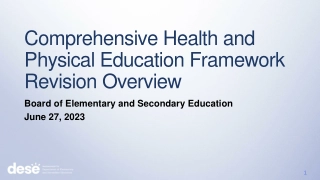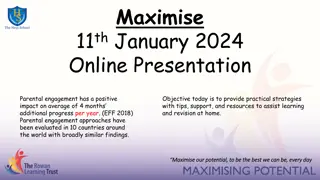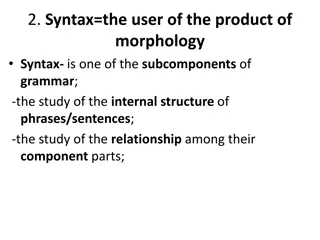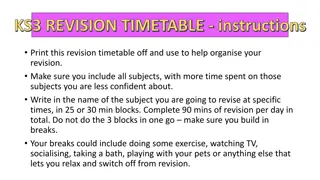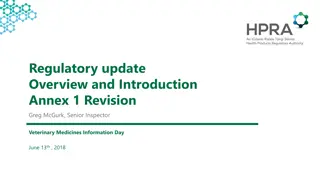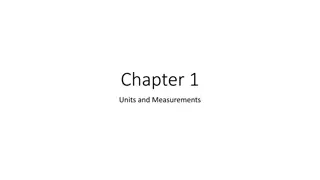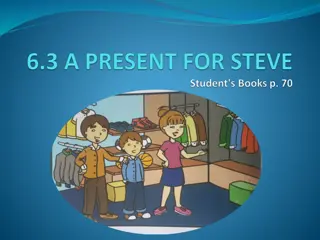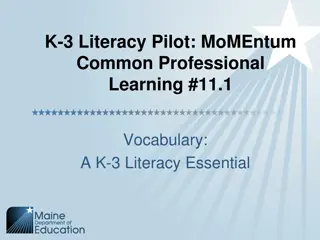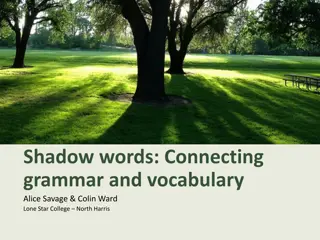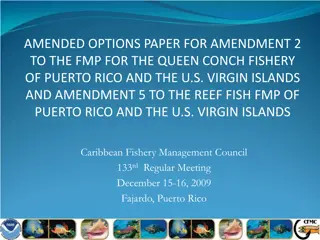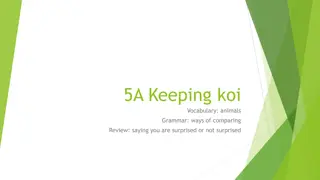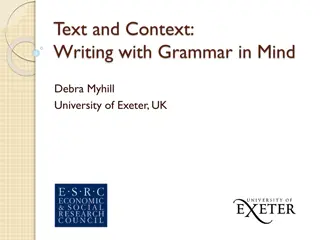Grammar and Vocabulary Revision: Units 13 and 14 Insights
Dive into the essentials of grammar and vocabulary from Units 13 and 14, focusing on adjectives, adverbs, articles, countable/uncountable nouns, and specialized vocabulary. Get extra practice resources and guidance on mastering key concepts. Enhance your language skills and comprehension with detailed explanations and exercises.
Download Presentation

Please find below an Image/Link to download the presentation.
The content on the website is provided AS IS for your information and personal use only. It may not be sold, licensed, or shared on other websites without obtaining consent from the author.If you encounter any issues during the download, it is possible that the publisher has removed the file from their server.
You are allowed to download the files provided on this website for personal or commercial use, subject to the condition that they are used lawfully. All files are the property of their respective owners.
The content on the website is provided AS IS for your information and personal use only. It may not be sold, licensed, or shared on other websites without obtaining consent from the author.
E N D
Presentation Transcript
REVISION 7 GRAMMAR AND VOCABULARY (with key)
Revision 7 reviews grammar and vocabulary from Units 13 and 14. Unit 13: Grammar Adjectives and adverbs(please refer to page 83 in your books) Vocabulary Learners with special gifts and talents (pages 80 and 81) Unit 14: Grammar Articles (and Countable/uncountable nouns in this revision) (please refer to pages 88 and 89 in your books) Vocabulary Integration, inclusion and transition to adulthood (pages 85 and 86) EXTRA PRACTICE: Please go to the En-Abilities learning platform at https://desarrollo.enabilities.prometeoinnovations.com/login/index.php Go to English course A2 Unit 5 Exercises 5.7; 5.8; 5.9 and Unit 5 extra exercise 2 (countable/uncountable nouns)
COUNTABLE AND UNCOUNTABLE NOUNS REVISION COUNTABLE UNCOUNTABLE I eat a banana every day. I like bananas. I eat rice every day. I like rice. Some/any + plural countable nouns We sang some songs. Did you buy any apples? Some/any + uncountable nouns We listened to some music. Did you buy any juice? Many/few + plural countable nouns We didn t take many photographs. I have a few things to do. Much/little + uncountable nouns We didn t do much shopping. I have a little work to do.
Many nouns can be used as countable and uncountable nouns, usually with a difference in meaning: Did you hear a noise just now? (here noise is countable and means a specific noise) I can t work here. There s too much noise. (here noise is uncountable and it is not possible to say too many noises) She has long hair. (uncountable don t say She has long hairs!) The cat has left white hairs all over the sofa. (countable) The following nouns are usually uncountable: accommodation bread information news traffic advice chaos luck permission weather baggage damage luggage progress work behavior furniture scenery
WHICH OF THE UNDERLINED PARTS OF THESE SENTENCES IS CORECT? 1. 2. 3. 4. 5. 6. 7. 8. 9. 10. Sue was very helpful. She gave us some very useful advice/advices. Did you hear noise/a noise just now? If you want to know the news, you can read paper/a paper. I want to print some documents, but the printer is out of paper/papers. I thought there was somebody in the house because there was light/a light on inside. Light/A light comes from the sun. I was in a hurry this morning. I didn t have time/a time for breakfast. Did you enjoy your holiday? Yes, we had wonderful time/a wonderful time. This is nice room/a nice room. Did you decorate it yourself? There s plenty of room/rooms for your luggage.
11. Did you have nice weather/a nice weather when you were away? 12. We were very unfortunate. We had bad luck/a bad luck. 13. Is it difficult to find a work/job at the moment? 14. Our travel/journey from Paris to Moscow by train was very tiring. 15. When the fire alarm rang, there was total chaos/a total chaos. 16. I had to buy a/some bread because I wanted to make some sandwiches. 17. Bad news don t/doesn t make people happy. 18. Your hair is/Your hairs are too long. You should have it/them cut. 19. The damage/the damages caused by the storm will cost a lot to repair.
WHICH OF THE UNDERLINED PARTS OF THESE SENTENCES IS CORECT? Key 1. 2. 3. 4. 5. 6. 7. 8. 9. 10. Sue was very helpful. She gave us some very useful advice. *uncountable Did you hear a noise just now? *countable in this meaning If you want to know the news, you can read a paper. * countable I want to print some documents, but the printer is out of paper. *uncountable I thought there was somebody in the house because there was a light on inside. *countable Light comes from the sun. *uncountable I was in a hurry this morning. I didn t have time for breakfast. *uncountable Did you enjoy your holiday? Yes, we had a wonderful time. *countable This is a nice room. Did you decorate it yourself? *countable There s plenty of room for your luggage. *uncountable
11. Did you have nice weather when you were away? *uncountable 12. We were very unfortunate. We had bad luck. *uncountable 13. Is it difficult to find a job at the moment? *we need a countable noun here (with the indefinite article a ), and job is countable while work is uncountable 14. Our journey from Paris to Moscow by train was very tiring. *countable please refer to the following slide for a detailed explanation 15. When the fire alarm rang, there was total chaos. *uncountable 16. I had to buy some bread because I wanted to make some sandwiches. *bread is uncountable and cannot be used with a 17. Bad news doesn t make people happy. *news is uncountable and always used with a singular verb please refer to slide 10 for a detailed explanation 18. Your hair is too long. You should have it cut. *hair is uncountable in this meaning 19. The damage caused by the storm will cost a lot to repair. *uncountable
GRAMMAR: Comparison travel Source: Longman Dictionary of Contemporary English available at https://www.ldoceonline.com/dictionary/travel You use travel to talk in general about the activity of travelling: Long-distance travel has become much cheaper. My interests are travel and photography. Travel is only used as an uncountable noun. Don t say: a travel | the travel travels Someone s travels are their journeys to many different places: On her travels, she visited Egypt, Jordan, and South Africa. I ll call you when I get back from my travels. Travels is always used as a plural noun in this meaning. Don t say: her travel | my travel trip You use trip to talk about an occasion when someone travels somewhere: He has gone to New York on a business trip. They have made several trips to Europe. Trip is a countable noun and can be used in the singular with a or in the plural. Don t use travel in this meaning. You say: Have a nice trip! Don t say: Have a nice travel!
Grammar: Countable or uncountable? Source: Longman Dictionary of Contemporary English available at https://www.ldoceonline.com/dictionary/news News is an uncountable noun and is followed by a singular verb: The news was not very good. News is used with the singular form of words such as this and that: He was shocked when he heard this news. Don t say: these news Prepositions with the news If someone or something is on the news, they appear or there is a report about them on a television or radio news programme: The minister was on the 10 o clock news. I saw the pictures of the crash on the news. If someone or something is in the news, they are being discussed in newspapers and on news programmes: Education has been in the news a lot this week.
ADJECTIVES AND ADVERBS Exercise III page 90 - key Supply the correct adjective or adverb 1. She is good at solving everyday problems. 2. His test results were satisfactory 3. Average students must work hard to keep up with their gifted peers. 4. Teachers were fascinated with his achievement.
ADJECTIVES AND ADVERBS EXTRA EXERCISE UNDERLINE THE CORRECT WORD 1. 2. 3. 4. She stepped confident/confidently onto the stage. The meeting at lunchtime was a complete/completely waste of time. She did good/well in the exam and she won a prize. Max tried hard/hardly to make the hotel receptionist understand him, but his Spanish wasn t fluent/fluently enough. After looking at the computer screen all day I had an awful/awfully headache. Even though Deborah did the job efficient/efficiently, they sacked her after two months. The doctor couldn t understand why Carol felt so hot because her temperature was normal/normally. The boy behaved bad/badly on a school trip. 5. 6. 7. 8.
ADJECTIVES AND ADVERBS EXTRA EXERCISE - KEY UNDERLINE THE CORRECT WORD 1. 2. 3. 4. She stepped confidently onto the stage. The meeting at lunchtime was a complete waste of time. She did well in the exam and she won a prize. Max tried hard to make the hotel receptionist understand him, but his Spanish wasn t fluent enough. After looking at the computer screen all day I had an awful headache. Even though Deborah did the job efficiently, they sacked her after two months. The doctor couldn t understand why Carol felt so hot because her temperature was normal. The boy behaved badly on a school trip. 5. 6. 7. 8.
ARTICLES Exercise IV page 90 - key Each of these sentences has a mistake in the use of articles. Find the mistakes and correct them 1. IDEA is a federal law of the United States. 2. The A residential school is a school where exceptional students live and learn. 3. A Students with disabilities prefer special to general schools. 4. AAn infant is a baby or a very small child up to the age of two. 5. In the Denmark 99% of students with learning disabilities are placed in general education classrooms.
VOCABULARY Write the appropriate term or phrase for each definition A natural ability to do one or more things extremely well Three different kinds of giftedness Additional materials and exercises for gifted students Placing gifted students in higher grades than their age peers A philosophical belief in special education that every individual, even the most disabled, should have an educational and living environment as close to normal as possible; a key principle of integration Placing all students with disabilities in general education classrooms An approach in which a special educator and a general educator collaborate to come up with teaching strategies for a student with disabilities
An approach in which a special and a general educator work side-by-side in a classroom A federal law of the United States according to which every school system must provide free appropriate education for every child regardless of how seriously they are disabled Recognizing a disability and starting education and treatment early in life Services available for older students with disabilities which help them in transition from adolescence to adulthood
VOCABULARY - KEY Write the appropriate term or phrase for each definition A natural ability to do one or more things extremely well - giftedness Three different kinds of giftedness analytic, synthetic, and practical Additional materials and exercises for gifted students - enrichment Placing gifted students in higher grades than their age peers acceleration A philosophical belief in special education that every individual, even the most disabled, should have an educational and living environment as close to normal as possible; a key principle of integration - normalization Placing all students with disabilities in general education classrooms full inclusion An approach in which a special educator and a general educator collaborate to come up with teaching strategies for a student with disabilities collaborative consultation
An approach in which a special and a general educator work side-by-side in a classroom co-teaching A federal law of the United States according to which every school system must provide free appropriate education for every child regardless of how seriously they are disabled Individuals with Disabilities Education Act (IDEA) Recognizing a disability and starting education and treatment early in life early intervention Services available for older students with disabilities which help them in transition from adolescence to adulthood transition services


